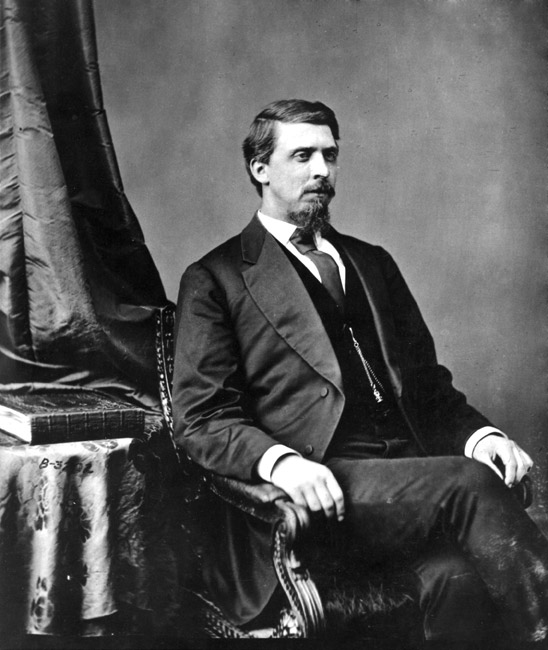Hanging Judge Isaac Parker – Hey there, curious minds! Have you ever wondered about the real-life “Hanging Judge” Isaac Parker, who inspired the character in Paramount+’s Western series ‘Lawmen: Bass Reeves‘? Well, grab your metaphorical cowboy hat and join me as we delve into the gripping tale of Judge Isaac Parker. This is no fictional drama; it’s the untold story of a man who shaped the Wild West with his unyielding commitment to justice.
In the third episode of ‘Lawmen: Bass Reeves,’ Judge Parker, played by the legendary Donald Sutherland, offers the job of a deputy marshal to the show’s protagonist, Bass Reeves. Intrigued? Let’s saddle up and explore the life of the real Hanging Judge, who lived during a time when the West was truly wild. Paramount+ is serving up history with a side of drama, and you won’t want to miss it.

Who was the Hanging Judge?
Isaac Charles Parker, born on October 15, 1838, in Barnesville, Ohio, was more than just a man in a robe; he was the great-nephew of Ohio Governor Wilson Shannon. This ambitious young man’s journey began when he opened his own law firm in 1862, navigating the murky waters of politics by becoming the city attorney for St. Joseph.
Parker’s loyalty lay with the Union forces as the Civil War erupted. He rose through the ranks, earning the title of corporal. However, his political compass shifted, leading him to bid farewell to the Democratic Party and embrace the ideals of the Republican Party. Elected to the House of Representatives from Missouri, Parker’s destiny took a new turn.
Fast forward to 1875, and Parker assumes the role of Judge of the District Court for the Western District of Arkansas, nominated by President Ulysses S. Grant. He wasted no time, appointing James F. Fagan as marshal and tasking him with selecting two hundred deputy marshals, including the infamous Bass Reeves. The mission? Safeguard the volatile Indian Territory.
What Happened to the Hanging Judge?
Now, let’s unravel the mysteries surrounding the Hanging Judge’s courtroom. Isaac Parker earned his ominous moniker by trying a staggering 13,490 cases during his 21-year tenure on the federal bench. His courtroom tales read like pages ripped from a Wild West novel, where justice was often swift and brutal.
Parker’s no-nonsense approach to law and order became evident in his very first session in May 1875. Picture this: 18 men, all charged with murder, standing trial. Eight of them received the ultimate punishment – the mandatory death penalty. The judge, with an air of authority as if he were the sheriff in a one-horse town, ordered the execution of six men simultaneously on September 3, 1875. This was just the beginning of Parker’s reputation as the “Hanging Judge.”
One of the notorious characters to face Parker’s gavel was Crawford Goldsby, also known as Cherokee Bill. Feared in the Indian Territory, Bill found himself on the wrong side of Parker’s judgment. In 1896, the judge sentenced Cherokee Bill to death, adding another notch to his macabre legacy.
Despite the grim facade, Parker paradoxically voiced his opposition to capital punishment. In an 1896 interview, he stated, “I favor the abolition of capital punishment, too, provided that there is a certainty of punishment.” A Hanging Judge advocating against hanging – now, that’s a twist in the tale.
How Did Judge Isaac Parker Die?
As the sun set on the Wild West era, Judge Isaac Parker faced his own reckoning. On November 17, 1896, at the age of 58, Parker succumbed to Bright’s disease and several other health conditions, including heart degeneration. Bright’s disease, a historical term for kidney disease, rode alongside Parker’s demise, marking the end of an era.
Parker reflected on his legacy during his final days, feeling misunderstood and misrepresented. “Misrepresented because misunderstood,” he mused. However, despite the controversies, Parker stood proud of the record he and his court at Fort Smith had built. The Hanging Judge, who never physically hung a man, attributed the enforcement of the law to the legal system itself.
Parker’s funeral in Fort Smith became a testament to his impactful life, with a record number of attendees bidding farewell. His final resting place is at the Fort Smith National Cemetery, a fitting spot for a man who left an indelible mark on the pages of Wild West history.
In conclusion, the Hanging Judge Isaac Parker was not just a character in a TV series but a real-life enigma who walked the fine line between justice and notoriety. As we ponder the legacy of this Wild West figure, we’re reminded that the pages of history, much like Parker’s courtroom, are filled with twists, contradictions, and unexpected turns. Saddle up, folks, for the untamed ride through the life and times of the Hanging Judge.
Also Like: 1883 Season 2: Is “The Bass Reeves Story” Based on a True Story?